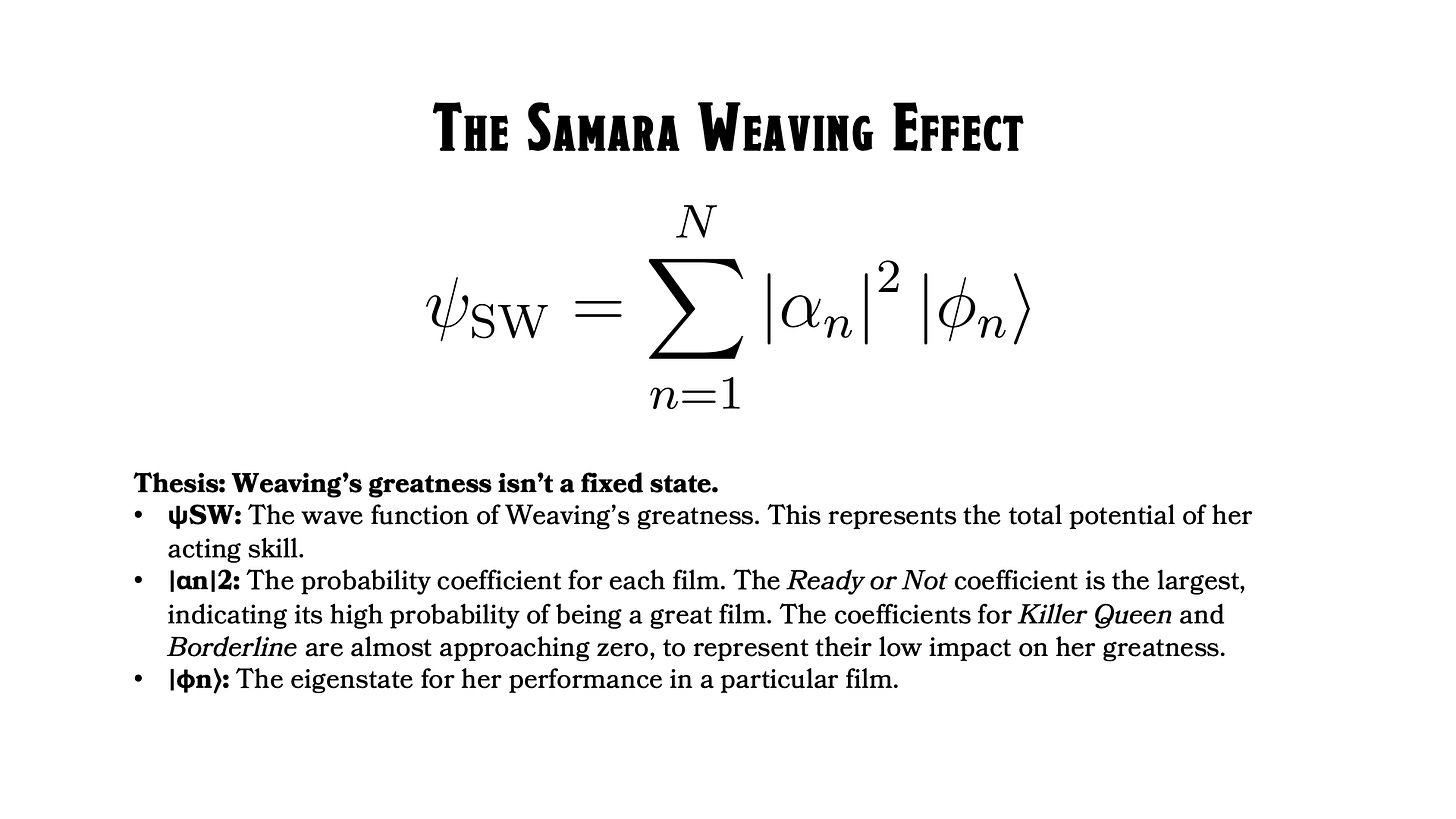Let’s start with a scientific principle I call the Samara Weaving Effect. I’ve been a big fan of hers for a while, but this is mostly built on the outstanding Ready or Not. The Babysitter was good, but Killer Queen felt like a bit of a lower-rent sequel. I didn’t really enjoy Borderline… so why do I think she’s great?
Get the audio edition on Spotify or Apple podcasts… or get the video on YouTube:
Weaving can really manifest cinema as an extradimensional space when she’s not mishandled. Eenie Meanie’sdirector, Shawn Simmons, is a man who understands this; he doesn’t just allow her signature youth-meets-Australia energy to power on through. Simmons broadcasts Weaving.
Some directors seem afraid of Weaving’s intensity. Not Simmons. He understands that she, being Australian, knows how to swear with the best of the Commonwealth, but that’s not the only thing that makes her screen presence unforgettable. In Eenie Meanie, it’s because she’s able to convince us that she doesn’t know all the answers or how to get to the end of this ride. She’s really unsure about who she should be with or who to trust. These are genuine problems that trouble the best of us, but with enough time on Earth, we’re able to guess with more certainty. Weaving’s 33 years old, but her Edie in Eenie Meanie needs her to channel a past self. So, sure: we get the swearing and the patter, but we also get someone who’s trying to fake it until they make it. But Edie’s only really faking out herself.
This is the Samara Weaving Effect. We marked it in Ready or Not, but seeing it again shows us she’s a leading actress who will dominate Hollywood. My prediction: Eenie Meanie’s the pivot where she’ll transition into the A-lister territory we know she’s good for. But we’ve all seen amazing actors trapped in terrible movies, right? Thankfully, Weaving isn’t carrying dead weight here. Eenie Meanie’s built around what I’m calling a heist of consequences.
This is where things get really interesting.
A Heist of Consequences
So we’ve got our lead, but Eenie Meanie is more than Weaving: it’s a heist movie where bad shit happens to maybe-good people. Which, I guess, means it’s probably not really a heist movie in the traditional sense. While it’s certainly a genre mash-up of getaway flicks like Baby Driver or Drive and heist movies like The Italian Job, where it brings home its point of difference is in how this heist isn’t one where clever people get to the end and swagger off screen.
A traditional heist movie promises us a few crucial elements. A mark, sure, but we also expect a clever plot—one where our heroes are almost undone but get away through bombast, smarts, or planning. Eenie Meanie does all of this, but then it ties it up with a Consequences Bow™. Characters in this movie cleave true to their nature, but there’s also a world reacting around them; if they care for others, that might cost, and if they’re stupid, that’s definitely going to cost. Just when we think our heroes are going to make it out in one piece, the consequences train departs the station, and shit really starts to unravel. The flick gives a late-stage let’s-call-it-a-fourth-act closing that extends the standard heist formula with a new premise: crime is messy, and the people doing it are criminals. Much as we’d like this to end like Ocean’s 11, it’s far more The Hurt Locker in how it shows the cost to its characters.
It’s this subversion of expectations that stops us from playing with our phone as we get to the end. It’s no longer predictable or ordinary. We feel as if Edie and John deserve to make it out because of what they’ve been through, but this just reminds us it’s nice to want things.
That doesn’t stop the fun, though, and I don’t want you to think this movie has a brutal ending that’ll make you want to end it all. The close is, ultimately, buoyant, and to get us there, we get well-done action scenes. The driving feels visceral. I mentioned Baby Driver and Drive before, and that’s the vibe delivered directly to your brain stem. We’ve got big American muscle cars, police chases, stunts, and outlandish drifting that would make Tokyo Driftblush. The framing of Edie while she’s driving shows real inertia through how her long, curly locks flow about the cabin. We know Weaving is going through some Top Gun G-forces to pull this off, and while we suspect there’s some level of stunt work at play, it convinces us that she’s really hauling ass in these machines.
I’m going to level with you: I briefly thought about importing a Camaro after watching this, then remembered how expensive gas is in New Zealand.
Anyway! It’s not just Weaving who excels here; Karl Glusman’s John has serious kinetic energy when he’s doing his action moments on screen. It builds an expectation of its own: he may be about to do something stupid, but also cool, whenever he does something stupid and cool.
The Human Cost: Relationships and Redemption
This is a story where two young lovers, Weaving’s Edie and Karl Glusman’s John, have had a bad slice of life served to them. They had each other, right up until they didn’t. It’s as much of a make-up flick as it is one where we work out that in order to go to heaven, someone needs to die.
I don’t want to go into too much spoiler potential, as the recovered-footage relationship between Edie and John is worth experiencing firsthand. But Edie trusts John for reasons that aren’t apparent at the start; we initially consider her a reclamation case, a person who’s just fallen for the wrong guy, but through the movie’s events, we discover that John is right in so many ways. Their relationship makes an ideal kind of sense.
The use of Andy Garcia is particularly poignant, not because he’s everyone’s favourite mobster, but because, partnered with Weaving’s role, they both get to answer the real question that crime asks: what’s the price, and who’s going to pay? Each starts on a different side of the argument, where Garcia’s Nico is employing Edie for that fabled one last job. Except it’s not a job to get rich; it’s a job to stop Nico from killing John because John’s a moron.
We get to see some S-tier performance from Garcia in the final scenes of the movie, leveraging his abilities more than his star power. There’s an acting partnership between Weaving and Garcia in these final moments that shows us that the people in this movie have difficult, complicated lives, and yet each understands the cost of living how they do. Nico and Edie start the movie as employer and driver, respectively. They finish the movie much more as equals—not in the sense that Edie becomes a crime lord, but in the sense that they both learned something ineffable about the people closest to them. All of Nico’s lifelong wisdom pales in the face of Edie’s lived experiences, and she ends up being a mentor to him in a way we never expected. And the lesson for Nico is a hard one, but he accepts it—because he is, at the heart of the matter, a man coloured by a certain set of principles.
The True Prize
While the movie has superb consequences, this goes both ways—while there are heavy losses on the team we’re rooting for, the ultimate scene before the credits roll is one that answers Edie’s largest boggle: Is family good? Is it worth it?
See, she’s distilled from proper A-grade trailer trash. Edie’s history is riddled with mistakes, but those mistakes aren’t solely hers. She’s trying to make things right, or at least, to do the right things. The film’s opening introduces us to her family. Later in the movie, we find them missing in action, until we’re reintroduced to her father. He’s moved on, just found another family to call his own—one without the problems he was principally responsible for creating in the first place. Edie’s journey has involved foster care, gifting her with an insecurity about who to trust or even like, and what she really wants is someone who isn’t trying to use her or sell her. That’s what family means to her.
Her prize at the end isn’t a zillion dollars like Ocean’s 11 delivered. But she gets what she needs, if not what she wants.
I kept thinking about this movie after the credits rolled. It’s a powerful, visceral, and ultimately deeply human story that uses the shell of a heist film to ask profound questions about loyalty, consequence, and what truly makes a family. Eenie Meanie isn’t just a great watch; it’s a film that sticks around in the back of your mind. If you want a heist movie that respects your intelligence, watch Eenie Meanie. If you want to see Samara Weaving cement her place as Hollywood’s next big A-lister, watch Eenie Meanie. And if you want a film that’ll make you text your actual family afterward—yeah, you know where I’m going with this. This isn’t just entertainment; it demands we assess our lives with the same gusto Edie does and perhaps makes us grateful that we’ve walked a different path. Easy recommendation.
Let me know in the comments below what you thought of Eenie Meanie. If this review has convinced you to buy a Subaru WRX, click Like! And if you’d also…




